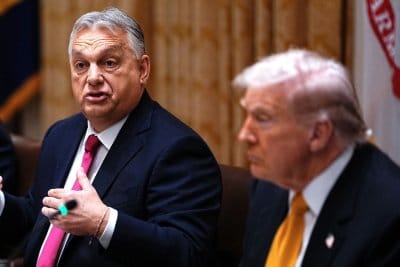Nov. 8 (UPI) — U.S. President Donald Trump has exempted Hungary from sanctions over the nation’s purchase of Russian gas and oil for one year after meeting with Prime Minister Viktor Orban.
Trump is a close ally of the far-right populist and authoritarian, who came into power in 1998 but was out of office from 2002 to 2010.
On Friday at the White House, Trump said he was considering the exemption because “it’s very difficult for him to get the oil and gas from other areas.”
After the meeting, Orban posted on X with a video: “Decision reached: President Donald Trump has guaranteed full sanction exemptions for the TurkStream and Friendship pipelines, allowing Hungary to continue providing families with the lowest energy prices in Europe. Thank you, Mr. President!”
The BBC confirmed the exemption was for one year.
Hungary’s dependence on Russian crude oil was 61% before Russia invaded Ukraine in 2022, then rose to 86% in 2024 and 92% this year.
On Oct. 22, the U.S. added sanctions against Russia, including blacklisting two of Russia’s largest oil companies: Open Joint Stock Company Rosneft Oil Company and Lukoil OAO.
Russia has been the world’s third-largest oil exporter, generating $120 billion in 2024 behind No. 1 Saudi Arabia at $225 billion and No. 2 Canada. $121billion. The United States is No. 4 at $117 billion.
Extensive sanctions were imposed after Russia’s full-scale invasion of neighboring Ukraine in February 2022. Initially, they were imposed in March 2014 after Russia annexed Crimea.
The Trump administration is attempting to use tariffs to halt third-country access, including by India.
But Trump said he understands Hungary’s situation of being a landlocked nation with limited access to gas and oil.
The U.S. State Department said Hungary has agreed to purchase U.S. liquefied gas worth about $600 million, NBC News reported.
Also, Hungary agreed to purchase American nuclear fuel, which it currently buys from Russia.
Despite similar policies as Trump, Orban said the pipelines are not “ideological” or “political” and instead a “physical reality.”
Orban had blamed U.S. President Joe Biden for “politically motivated sanctions,” including his top aid Antal Rogaan with allegations of corruption.
“Now we are quite a good position to open up a new chapter – let’s say a golden age – between the United States and Hungary,” Orban said.
Trump has used the term “golden age of America,” declaring it began with his second inauguration on Jan. 20.
The exemption was criticized by an analyst.
“The U.S. decision is a terrible and unnecessary mistake that will allow over 1 billion euros [$1.2 billion] to flow into the Kremlin’s war chest,” Isaac Levi, with the Center for Research on Energy and Clean Air, told CNN. “By carving out special treatment for Hungary, Washington is telling other buyers that they can keep handling Russian oil and still expect to be let off the hook.”
Levi noted the Czech Republic is another country with a port that manages without Russian crude oil and has lower fuel prices at the pump than Hungary.
“This clearly shows that the oil flows that continue to finance Putin’s war in Ukraine are entirely unnecessary,” he said.
Trump said he is “very disturbed” by other European countries that still buy Russian commodities despite not being landlocked.
Hungary and neighboring Slovakia are the only EU countries still getting Russian oil from the Druzhba pipeline.
EU countries’ gas comes via Turkey through the TurkStream pipeline. Russia’s share of EU gas imports fell from 40% pre-invasion to 11% in 2024.
But Slovakia is “almost 100% dependent” on Russian crude oil, according to a report from the Center for Research and Energy and Clean Air and the Center for the Study of Democracy.
The European Commission granted an exemption to Hungary, Slovakia and the Czech Republic – three countries heavily reliant on Russian imports – for time to reduce reliance.
Other nations don’t have close relations with Russian President Vladimir Putin.
For other products, Trump has imposed a baseline 15% tariff as part of a trade agreement with the European Union.
That includes Hungary’s car industry.
On Oct. 21, Trump canceled his planned summit with Putin in Budapest, Hungary, after Putin’s demands on ending the war in Ukraine remained.
